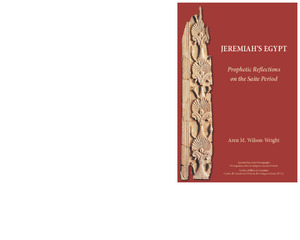Por favor, use este identificador para citar o enlazar este ítem:
https://repositorio.uca.edu.ar/handle/123456789/16596| Campo DC | Valor | Lengua/Idioma |
|---|---|---|
| dc.contributor.author | Wilson Wright, Aren M. | es |
| dc.coverage.spatial | Egipto | es |
| dc.date.accessioned | 2023-06-27T11:14:04Z | - |
| dc.date.available | 2023-06-27T11:14:04Z | - |
| dc.date.issued | 2023 | - |
| dc.identifier.citation | Wilson Wright, A. M. Jeremiah’s egypt prophetic reflections on the saite period [en línea]. Ancient Near East Monographs (30). Atlanta : Society of Biblical Literature; Centro de Estudios de Historia del Antiguo Oriente, 2023. Disponible en: https://repositorio.uca.edu.ar/handle/123456789/16596 | es |
| dc.identifier.isbn | 978-1628374629 | - |
| dc.identifier.uri | https://repositorio.uca.edu.ar/handle/123456789/16596 | - |
| dc.description.abstract | The book of Jeremiah exhibits several symptoms of what might be called “Egyptomania.” It contains more references to Egypt than any other book of the Hebrew Bible except Genesis and Exodus and mentions Egypt more often than any other foreign nation except Babylon. Many of these references are highly specific, touching on Egyptian geography (Jer 2:16), religious practices (Jer 46:25), and military and political decisions (Jer 37:5).1 Jeremiah 42:1–43:7 even preserves a tradition that the prophet Jeremiah relocated to Egypt following the assassination of Gedaliah, the Babylonian appointed governor of Judah. The reason for this “Egyptomania,” as I will argue throughout this book, is primarily historical. As recent scholarship on Egyptian-Israelite interaction has shown, the pharaohs of the Twenty-Sixth or Saite Dynasty2 (664– 525 BCE) ruled Judah as a vassal state for much of the late seventh and early sixth centuries BCE—the time period during which the book of Jeremiah first began to take shape. My goal in this book, therefore, is to interpret the book of Jeremiah in light of this historical background. Focusing on the experiences of Judahites living under Egyptian rule, I argue, changes how we read and interpret the book of Jeremiah in three important ways: it helps explain the antipathy toward Egypt evident in several passages of this prophetic work; it provides a historical anchor for redactional approaches to dating the text; and it places the work’s repeated calls for submission to Babylon in a different light. These calls do not present a choice between Judahite autonomy and Babylonian domination, but rather a choice between Egyptian and Babylonian control... | es |
| dc.format | application/pdf | es |
| dc.language.iso | eng | es |
| dc.publisher | Society of Biblical Literature | es |
| dc.rights | Acceso abierto | * |
| dc.rights.uri | http://creativecommons.org/licenses/by-nc-sa/4.0/ | * |
| dc.source | Ancient Near East Monographs - Monografías sobre el Antiguo Cercano Oriente, Vol. 30. Atlanta : Society of Biblical Literature; Centro de Estudios de Historia del Antiguo Oriente, 2023. | es |
| dc.subject | HISTORIA ANTIGUA | es |
| dc.subject | HISTORIA DE EGIPTO | es |
| dc.subject | BIBLIA. A.T. JEREMÍAS | es |
| dc.subject | HISTORIA POLITICA | es |
| dc.subject | HISTORIA MILITAR | es |
| dc.subject | JUDIOS | es |
| dc.subject | RELIGION | es |
| dc.subject | FUENTES DE LA HISTORIA | es |
| dc.title | Jeremiah’s egypt prophetic reflections on the saite period | es |
| dc.type | Libro | es |
| uca.disciplina | HISTORIA | es |
| uca.issnrd | 1 | es |
| uca.affiliation | Fil: Wilson Wright, Aren M. Investigador independiente | es |
| uca.version | publishedVersion | es |
| item.languageiso639-1 | en | - |
| item.fulltext | With Fulltext | - |
| item.grantfulltext | open | - |
| Aparece en las colecciones: | Series monográficas | |
Ficheros en este ítem:
| Fichero | Descripción | Tamaño | Formato | |
|---|---|---|---|---|
| jeremiahs-egypt-prophetic-reflection.pdf | 6,5 MB | Adobe PDF |  Visualizar/Abrir |
Visualizaciones de página(s)
70
comprobado en 27-abr-2024
Descarga(s)
121
comprobado en 27-abr-2024
Google ScholarTM
Ver en Google Scholar
Altmetric
Este ítem está sujeto a una Licencia Creative Commons

